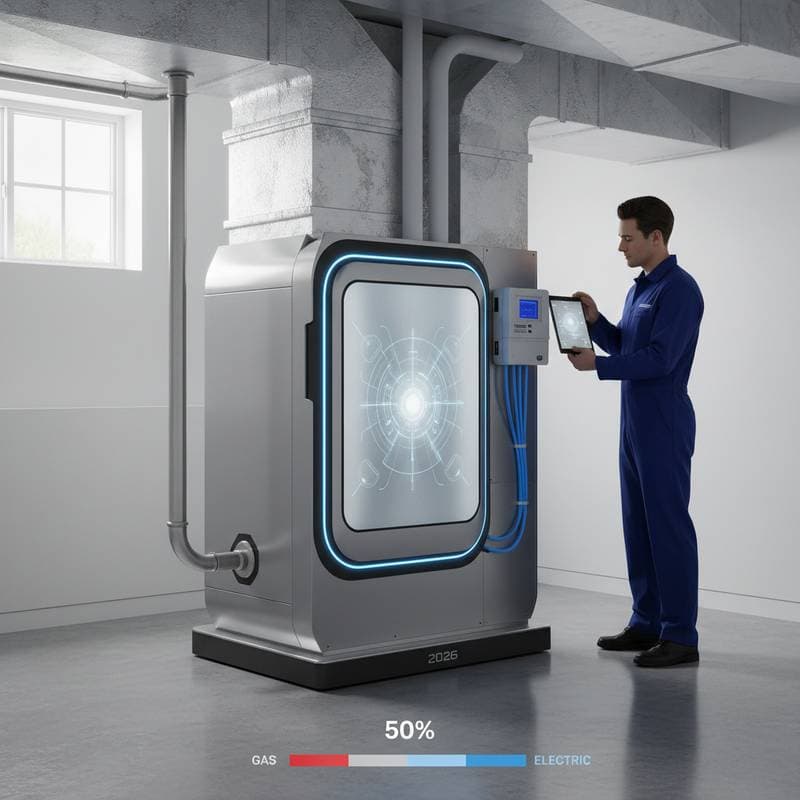How Much Can You Save with Heat Pump Water Heater Rebates?
Homeowners seeking to reduce energy expenses and modernize hot water systems now have access to substantial heat pump water heater rebates. The typical cost of a heat pump water heater falls between $1,500 and $3,500 for installation, yet rebate programs often lower this figure by more than $1,000. These incentives offset upfront expenses, render energy-efficient systems more accessible, and decrease long-term utility bills.
This guide details the mechanics of heat pump water heater rebates, anticipated savings, key cost elements, and qualification criteria. For those replacing outdated tanks or selecting advanced models, grasping rebate structures enables significant financial gains alongside sustained energy advantages.
How Heat Pump Water Heater Rebates Reduce Costs
Rebate initiatives promote the adoption of energy-saving appliances among homeowners. Sponsors include federal and state programs, utility providers, and regional energy efficiency efforts.
Typical Rebate Amounts
| Program Type | Average Rebate | Eligibility Example |
|---|---|---|
| Federal Incentive | $300 – $2,000 | Based on model efficiency and tax credit caps |
| State Energy Program | $200 – $1,000 | Differs by state and certification standards |
| Utility Company Rebate | $150 – $800 | For customers upgrading from older electric models |
| Low-Income Rebate | Up to $2,500 | Targeted at eligible low-income households |
Layering these rebates frequently trims installation expenses by 30 to 50 percent. Eligible households often access several programs simultaneously, amplifying overall reductions.
Maximizing Savings Through Energy Efficiency
Heat pump water heaters achieve savings by drawing heat from ambient air rather than producing it through resistance elements. This process substantially cuts energy use and associated costs over the system's life.
Implement these strategies to optimize performance:
- Position the unit in a warmer space, like a basement or utility closet, to enhance heat extraction.
- Integrate a timer or smart thermostat to align heating with off-peak electricity rates.
- Adjust the thermostat to 120 degrees Fahrenheit for balanced safety and efficiency.
- Wrap hot water pipes with insulation to prevent energy loss during distribution.
- Schedule annual maintenance, including filter cleaning and drain line inspections, to sustain peak operation.
Such practices not only prolong equipment durability but also ensure consistent output.
Example of Potential Savings
The following comparison highlights rebate effects and efficiency gains:
| Item | Standard Electric Heater | Heat Pump Water Heater (with Rebates) |
|---|---|---|
| Equipment + Installation | $1,200 | $3,000 |
| Rebate Savings | $0 | -$1,000 |
| Net Cost | $1,200 | $2,000 |
| Annual Energy Cost | $600 | $250 |
| 10-Year Energy Cost | $6,000 | $2,500 |
| Total 10-Year Cost | $7,200 | $4,500 |
This calculation demonstrates a $2,700 net savings over a decade, despite the elevated initial outlay.
Heat Pump Water Heater FAQs
How long does a heat pump water heater last?
Units generally operate for 10 to 15 years under regular upkeep. Conduct filter replacements, annual professional checks, and debris removal to preserve efficiency and longevity.
How noisy are heat pump water heaters?
Operation produces a gentle hum akin to a refrigerator compressor. Sound levels typically measure 40 to 60 decibels, rendering them unobtrusive when placed in enclosed areas like basements.
Can a heat pump water heater work in cold climates?
Performance remains viable with appropriate setup. In cooler areas, site the unit where temperatures stay above 40 degrees Fahrenheit. Hybrid variants incorporate electric resistance backups for reliability in sub-freezing conditions.
How quickly can rebates be received?
Timelines differ by provider, ranging from 4 to 8 weeks post-submission. Certain utilities provide point-of-purchase discounts for immediate application.
Do rebates apply to both new construction and replacements?
Programs extend to replacement installations and new builds alike, provided the equipment satisfies specified efficiency benchmarks.
Are there financing options for heat pump water heaters?
Utility partners frequently collaborate with lenders to supply low-interest loans or on-bill repayment plans, enabling gradual payments offset by reduced energy charges.
Getting Heat Pump Water Heater Quotes
Obtain estimates from certified HVAC or plumbing specialists prior to commitment. Multiple bids facilitate price transparency and rebate verification.
Questions to Ask Contractors
- Do you hold certification for installing ENERGY STAR-rated heat pump water heaters?
- What capacity unit suits my household's hot water demands?
- What is the full installation price, encompassing labor and permits?
- Which local rebate programs align with my location and selected model?
- Is stacking incentives from various sources permissible?
- What annual energy reductions can I anticipate versus my current setup?
- Will you manage rebate applications or supply necessary paperwork?
- What coverage applies to parts and labor under warranty?
- Do you offer post-installation maintenance packages?
- Can you share references from comparable projects?
These inquiries equip you to select a reliable provider and achieve optimal outcomes.
Securing Your Upgrade and Savings
Transitioning to a heat pump water heater stands as a proven method to curb energy expenditures while accessing generous incentives. Homeowners who pursue these opportunities diminish setup costs, elevate efficiency, and secure dependable hot water supply for extended periods.
Examine rebates from your utility provider, state energy agency, and federal sources before proceeding. Solicit proposals from licensed installers capable of confirming compliance and executing the work proficiently.
Strategic preparation merges rebate benefits with enduring efficiency, fostering an upgrade that advances environmental goals and delivers tangible financial returns through enhanced comfort and reduced bills.





